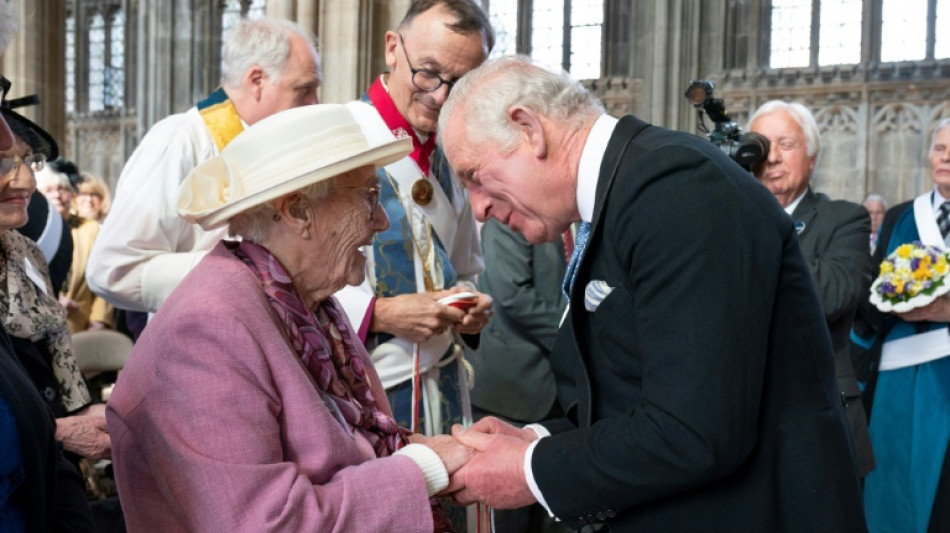
RBGPF
61.2800


In a hushed atmosphere of a south London mosque, a dozen Muslims of all ages wait to sign a book of condolences for Queen Elizabeth II at an interfaith ceremony.
The scene typifies a United Kingdom that is home to many cultures and beliefs, which Charles III has solemnly vowed to protect as king, despite his unique constitutional role as the head of the Church of England.
The king stressed on Friday that he was "a committed Anglican Christian" but recognised that Britain is a very different country to the one his mother inherited in 1952.
"I have always thought of Britain as a 'community of communities,' he told faith leaders at a reception at Buckingham Palace.
"That has led me to understand that the sovereign has an additional duty... to protect the diversity of our country, including by protecting the space for faith itself."
The role of his late mother, Queen Elizabeth II, in helping integrate different cultures and faiths appears to have left the country's growing Muslim population with a strong appreciation for the UK's longest-serving monarch.
"I'm a first generation Muslim in this country," Danial Saeed, 19, told AFP at the huge Baitul Futuh mosque in south London.
"We got to practise our faith in this country under the protection of our queen."
At the mosque, Rafiq Hayat, head of the Ahmadiyya Muslim Community organisation, predicted a seamless transition in relations with Charles III.
"Our loyalty to the king will be just as strong as it was to her majesty the queen," he told AFP.
Hayat argued that Charles has "a great relationship with the Muslim world", noting he had praised the teachings of Islam and recited Koranic verses in the past.
"I think he feels that Islam is very much sitting comfortably with Christianity and other world faiths," he said.
- 'Amazing gesture'-
Friday's reception for representatives of the main religions practised in Britain was another sign of his intent to reach out beyond the Christian faith groups.
He brought forward the audience in order to allow Chief Rabbi Ephraim Mirvis to be able to return home in time for the Jewish Sabbath.
A source close to the Chief Rabbi told BBC News that decision was an "amazing gesture of respect and thoughtfulness".
Ian Bradley, theology professor at the University of St Andrews, said the British monarch's role is "to bind the nation together in all sorts of ways but not the least in terms of faith".
And that does not need to be restricted to Christianity, he said, noting some of the strongest supporters of monarchy belong to minority faiths in Britain.
Rami Ranger, president of the British Sikh Association, said the late queen gave his community "an immense sense of security".
"She was above party politics and could unite the nation regardless of race, religion and colour," he added.
- Important message -
Bradley believes there is a wider "spiritual dimension" to the UK monarchy which provides a "spiritual heart" to the country's so-called unwritten constitution, that has evolved over centuries.
Recognising the monarch's role as the "Defender of the Faith and Supreme Governor of the Church of England", the Archbishop of Canterbury Justin Welby will anoint Charles III with holy oil and bless the new king at his future coronation.
Although the monarchy is deeply anchored in Christianity, Charles has consistently promised to defend all faiths as king.
"It's very different from France... being a very clearly secular state and having a secular constitution," said Bradley.
"We are now largely a post-Christian secular nation, but a lot of people still like that the monarchy still has that religious aura."
Echoing Hayat, Bradley points out that while Charles is a church-going Christian, he is "very interested in Islam (and) in spirituality in general".
Just as the new king's well-known stances on environmental issues resonate in particular with young people, his openness regarding religion could chime with his subjects in Britain and beyond.
Among Christians, he has shown a particular fondness for the Orthodox faith, making several retreats to monasteries on Mount Athos in Greece.
Meanwhile he also touched Britain's Jewish community by visiting Israel -- something his late mother never did -- though it was not on an official visit.
Charles also commissioned portraits of Holocaust survivors, a gesture of remembrance that was also appreciated.
For Hayat, the new king is well placed when it comes to talking about faith.
"When he speaks people listen," he said.
"That will be a very important message that he will send out to the whole world that Islam is a religion of peace and that Islam is not associated with terrorism.
"That will make a huge difference to the relationship between the Muslim world and the Christian world and the Jewish world."
Y.Hara--JT